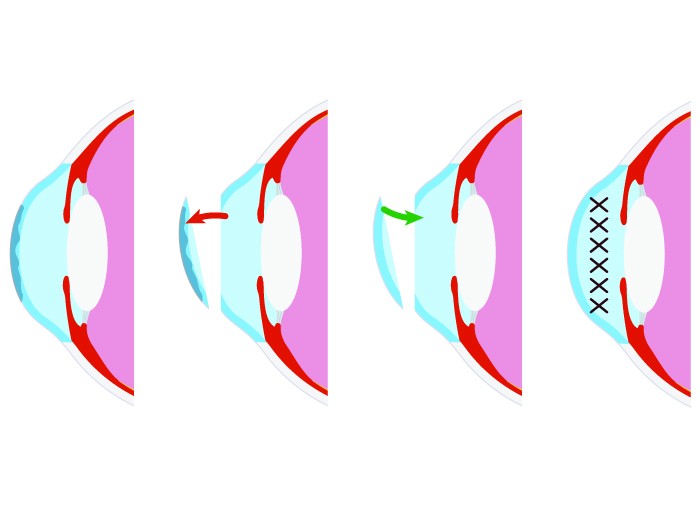Cornea Transplant Surgery (Keratoplasty) in Kondapur, Hyderabad
A surgical procedure to replace parts of your cornea with corneal tissues that is provided by a donor is referred to as Keratoplasty surgery or a Cornea Transplant surgery.
What Is Keratoplasty?
Keratoplasty or a Cornea Transplant surgery is a surgical procedure that is performed in order to replace the damaged parts of the cornea with a healthy donor’s corneal tissue. Your cornea is the transparent, dome-shaped surface of your eye, through which light enters your eye and plays a crucial part in helping your eyes see clearly. It is usually performed to improve sight, treat severe infections or damages or relieve pain

How Is Keratoplasty Performed?
Keratoplasty removes either the entire or partial thickness of the diseased cornea, hence, there are two main types of Keratoplasty or Cornea Transplant surgery:
- Penetrating Keratoplasty (PK): refers to the traditional full-thickness cornea transplant. For this kind of method, your surgeon cuts through the entire thickness of the diseased cornea in order to remove a small button-sized disk of corneal tissue, for which a special instrument is used in order to make a precise circular cut. Then the donor’s cornea which has been cut precisely to fit is placed and stitched in place. The stitch may be removed by the surgeon in your later visit.
- Endothelial Keratoplasty (EK): refers to the back layer cornea transplant. For this procedure, the surgeon removes the diseased corneal tissue from the back corneal layers and replaces it with the donor’s healthy corneal tissue. There are two types of Endothelial Keratoplasty:
- Descemet stripping endothelial keratoplasty (DSEK): where about one-third of the cornea is replaced with the donor’s tissue.
- Descemet membrane endothelial keratoplasty (DMEK): in this procedure, a thinner layer of the donor’s tissue is used and it is extremely fragile and thin, hence, this method is very challenging.
What Are The Benefits Of Keratoplasty?
A few of the many benefits of Keratoplasty may include:
- It helps restore vision
- Reduces pain
- Improves the appearance of a damaged eye
- Improves the appearance of a diseased eye
- Helps treat a cornea that bulges out
- Help treat cornea scarring, which may be caused due to some infection etc.
- Helps treat a swollen cornea
What Are The Side Effects Of Keratoplasty?
Keratoplasty or Cornea Transplant surgery is fairly a safe operation, however, as in all operations, there may be few side effects or risks to it, for instance:
- Eye infection
- Rejection of the donor cornea
- Bleeding
- Increase of pressure within the eyeball
- Problems with stitches used to secure the donor cornea
- Retinal detachment
- Retinal swelling
If you witness any of these symptoms please seek medical attention and consult with and healthcare professional.
Who Are The Right Candidates For Keratoplasty?
You must consult a healthcare professional if you witness vision loss or cornea infection etc.
You must also refer and ask yourself a number of relevant questions before a Keratoplasty surgery, which may include:
- Will you be able to take time off of school or work in order to recover properly?
- How will the cost of cornea transplant surgery affect your financial situation?
Request an appointment at Apollo Spectra Hospitals, Kondapur
Call 1860-500-2244 to book an appointment
Your eyesight should start improving after a few weeks or so, however, it may take months or even a year for your eye with the donor corneal tissue to have a stable vision.
The seriousness of rejection can depend on the type of transplant that may have been carried out for you. However, some common symptoms of a Keratoplasty or a Corneal Transplant may include:
- Redness
- Blurred vision
- Watering
- Pain in the eye
- Discomfort
If you witness any of these symptoms, then please seek medical attention and consult with a healthcare professional.
Sometimes, neither glasses nor contacts are required after a Keratoplasty for Corneal Transplant, however, most of the time a form of vision correction is required after surgery.
Symptoms
Our Top Specialities
NOTICE BOARD
CONTACT US
CONTACT US
 Book Appointment
Book Appointment


.svg)
.svg)
.svg)
.svg)








